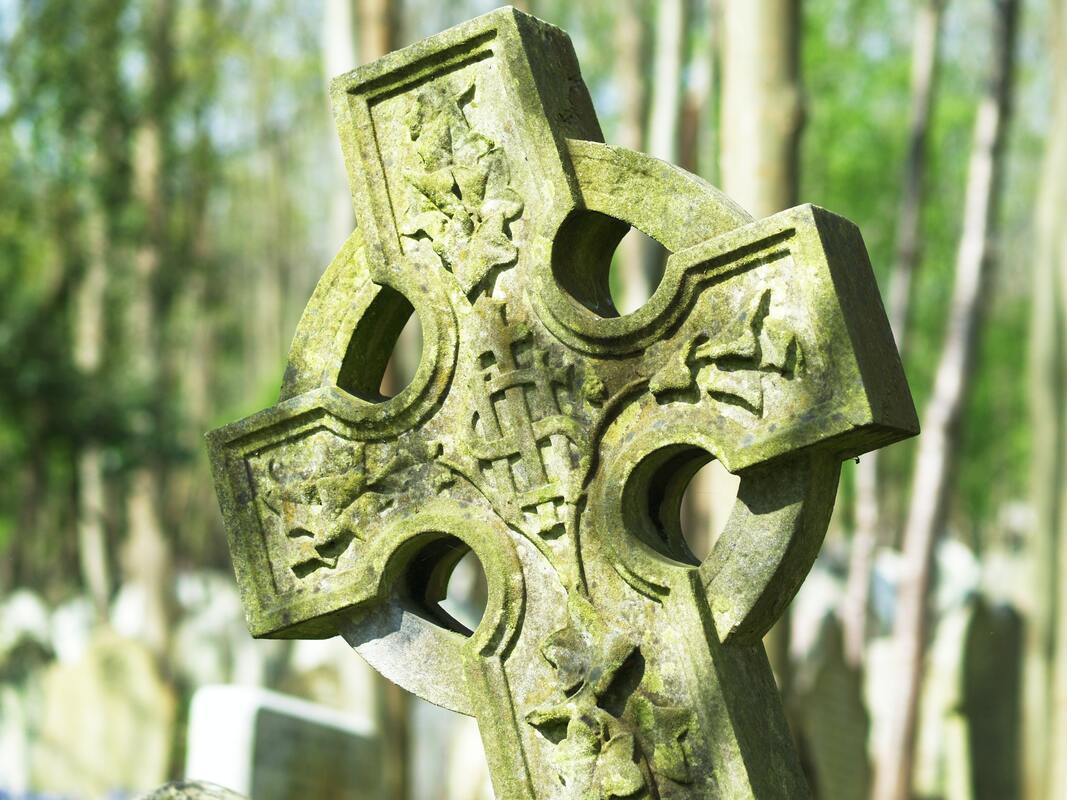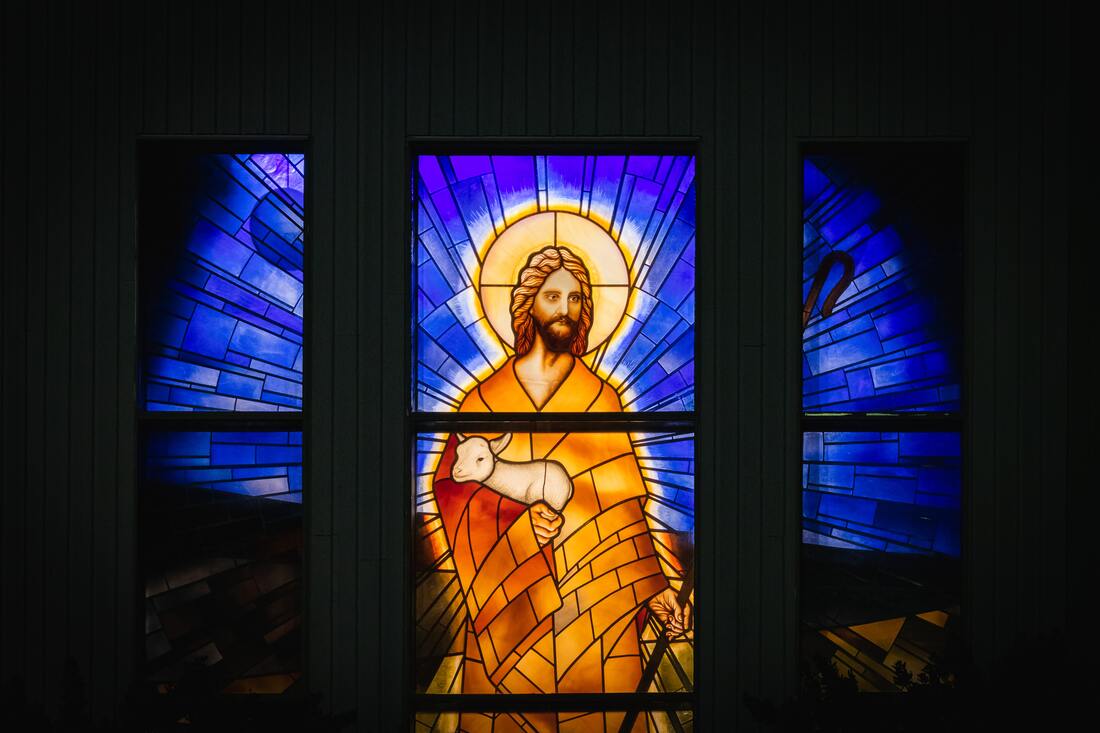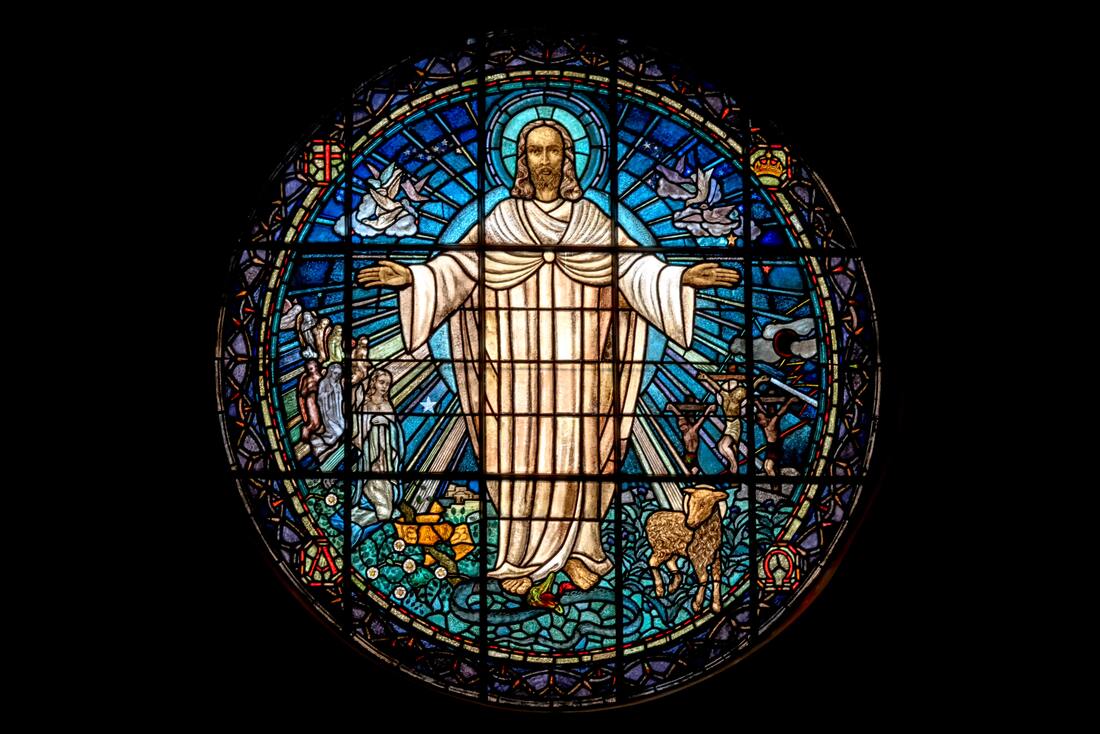|
The Heidelberg Catechism: Lord's Day 13
33. Question: Why is He called God's only begotten Son, since we also are children of God? Answer: Because Christ alone is the eternal, natural Son of God.[1] We, however, are children of God by adoption, through grace, for Christ's sake.[2] [1] John 1:1-3, 14, 18; 3:16; Rom. 8:32; Heb. 1; I John 4:9. [2] John 1:12; Rom. 8:14-17; Gal. 4:6; Eph. 1:5, 6. 34. Question: Why do you call Him our Lord? Answer: Because He has ransomed us, body and soul,[1] from all our sins, not with silver or gold but with His precious blood,[2] and has freed us from all the power of the devil to make us His own possession.[3] [1] I Cor. 6:20; I Tim. 2:5, 6. [2] I Peter 1:18, 19. [3] Col. 1:13, 14; Heb. 2:14, 15.
0 Comments
Fair Weather Fans
In John 6, Jesus laid some hard, heavy, and profound teachings upon the hearts and minds of the disciples, not just the Twelve, but all who were following him at the time. We do well to remember that earlier in chapter 6, Jesus had accused many of those so-called “followers” of only tagging along because of what they thought Jesus could give them, what he could do for them. Why? Because earlier (John 6:1-15), Jesus fed the 5,000 and they were duly impressed. Who wouldn’t want to be around someone who could do that? They liked it. It benefited them. They wanted more. So, they followed him. But Jesus knew their hearts and how the heart of man is deceitful above all things (Jeremiah 17:9; cf. Psalm 64:6). Thus, he knew their real motives. That’s why he told them in verse 26, “I tell you the truth, you are looking for me, not because you saw miraculous signs but because you ate the loaves and had your fill. The Bread of Life Jesus then used this as an opportunity to tell them about the Bread of Life which could sustain them eternally. Of course, we know it is he who was (and is) the Bread of Life – and only by believing in him could they receive real life (John 6:29, 47-48). Jesus then developed this idea of receiving him as the Bread of Life by telling those half-hearted disciples they must eat his body and drink his blood. This was and is a truly amazing notion, and I think we can appreciate on that side of the Cross, without 2,000 years of Christian tradition and teaching on the subject, it would have been pretty hard to swallow. We can understand why many responded, “This is a hard teaching. Who can accept it?” (John 6:60) A Shock to the System Again, Jesus knew this was what they were saying and thinking. He knew this was a massive shock to their systems, so he reminded them that his words were (and are) life (John 6:63). And yet, again, he knew their hearts (John 2:24-25) and knew the real reason they were following him around. But he also realized some, even if a minority, would accept this hard teaching and remain with him and in him (John 15:1-8). Sad News Alas, verse 66 of John 6 is the bearer of sad news. From this time many of his disciples turned back and no longer followed him. Discipleship is hard. Following after Christ means picking up crosses and denying oneself. It includes hard teachings. It wasn’t all giant picnics on the countryside with incredible, crowd-pleasing miracles performed by Jesus. Following Jesus included some tough ideas, ideas that run contrary to how unregenerate people think. So, they turned away. Some, if not many, continue to turn away today when Christianity proves too tough, too ordinary, too unexciting, or too demanding. Some folk are intellectually honest and leave the faith altogether. Others are less honest – with themselves and others – and remain in the church but have long-since left the Jesus of Holy Scripture and his hard teachings. The Desertion of Demas The Apostle Paul understood this truth from his personal experience. One of Paul’s co-laborers in the gospel ministry betrayed him. After a far-reaching missions tour and much fruit for the Kingdom (Colossians 4:14 and Philemon 24), Demas abandoned Paul as Paul sat in prison, toward the very end of Paul’s ministry and life. Perhaps the demands were too severe. Maybe the cost was too high. Possibly the thought of sitting in a prison cell didn’t seem like a proper reward for all his efforts. We’re not sure of the details, but Paul offered this insight regarding Demas’ desertion. Do your best to come to me quickly, for Demas, because he loved this world, has deserted me and has gone to Thessalonica. (2 Timothy. 4:9-10) (Emphasis mine) What does this mean for us? Well, if this committed Christian missionary and personal companion of the great Apostle Paul could desert his beloved brother in Christ out of love for the world, just imagine what can happen to us if we do not stand firm in our faith. The Devil’s Dark Dominion It is not too difficult, in light of that, to understand why John would later write in 1 John 2:15-16, Do not love the world or anything in the world. If anyone loves the world, the love of the Father is not in him. For everything in the world–the cravings of sinful man, the lust of his eyes and the boasting of what he has and does–comes not from the Father but from the world. Obviously, when the biblical writers use the word “world” in this way, they are not talking about the earth as a planet or the world of people (after all, remember who it was that God “so loved” in John 3:16). Instead, “world” in this context is that dark dominion of sin that John describes in 1 John 2:16 (cf. James 4:4). The world depicted in this way is that realm of the City of Man under the direct dominion of Satan and against whom is our real battle (Ephesians 6:10-13). The Kingdom of Life and Light But those who follow Christ, the Bread of Life, have life indeed, and light. The darkness is falling (1 John 2:8) because of this Light and one day will be done away with completely (Revelation 22:5). Are you of and in the light or are you still enslaved in darkness? It is possible to know the answer to that question. John tells you how you can know in 1 John 1:7 and 1 John 2:3-6. But if we walk in the light, as he is in the light, we have fellowship with one another, and the blood of Jesus, his Son, purifies us from all sin. We know that we have come to know him if we obey his commands. The man who says, “I know him,” but does not do what he commands is a liar, and the truth is not in him. But if anyone obeys his word, God’s love is truly made complete in him. This is how we know we are in him: Whoever claims to live in him must walk as Jesus did. When we turn our backs to the fallen, darkened, and decaying world in which we were born and actively resided – when we shun its allurements and temptations – when we reject the dominion of its dark king and his fleeting rule – then and only then can we call ourselves subjects of the Kingdom of Light that knows no end. It is only by trusting in the one true King that brings eternal life (1 John 2:17). For it is this King who has rescued us from the dominion of darkness and ushered us into his own glorious Kingdom (Colossians 1:13). Two Things to Remember When the temporary and illegitimate “king” of this world and his enslaved servants seek to lead us astray, remember two things: First of all, as they are now, you once were. It is by sovereign grace alone you were rescued and released from the bondage of the dark lord of this world. It is by the pleasure of God’s will you saw your depraved nature for what it was and made sick by its very sight. Thus, there is no room for boasting on our part. We boast only in God’s grace, our Lord Jesus Christ, and his Cross. Second, stray but a little to the left or to the right and you may very well find yourself on another path altogether, for the path of our new King is straight, narrow, and hard. We must be careful not to wander off. Remember the words of the Apostle Paul regarding those who did in his day: Timothy, guard what has been entrusted to your care. Turn away from godless chatter and the opposing ideas of what is falsely called knowledge, which some have professed and in so doing have wandered from the faith. (1 Timothy 6:20-21) In light of this, let us uniformly and with great courage declare with Peter and the other faithful disciples who, when Jesus asked them if they too wanted to leave him (John 6:67), replied: “Lord, to whom shall we go? You have the words of eternal life. We believe and know that you are the Holy One of God.” (John 6:68-69) Any other profession about our Lord is a lie and the Father is not a part of it (1 John 2:22-23). Stand Firm to the End True Christianity is not easy. Often a person's response to tough times and hard teachings reveals their real motives in following Christ. Christian history is littered with those who could or would not stay true to the end. But before we cast judgment on them, we better take a long, hard look in the mirror and recognize the grace of God that stares back at us. It is only in his strength we can stand firm. But stand firm we must, for God’s glory and the good of our neighbors, indeed, for our world. Walking Points
The Heidelberg Catechism: Lord's Day 12
31. Question: Why is He called Christ, that is, Anointed? Answer: Because He has been ordained by God the Father, and anointed with the Holy Spirit,[1] to be our chief Prophet and Teacher,[2] who has fully revealed to us the secret counsel and will of God concerning our redemption;[3] our only High Priest,[4] who by the one sacrifice of His body has redeemed us,[5] and who continually intercedes for us before the Father;[6] and our eternal King,[7] who governs us by His Word and Spirit, and who defends and preserves us in the redemption obtained for us.[8] [1] Ps. 45:7 (Heb. 1:9); Is. 61:1 (Luke 4:18; Luke 3:21, 22. [2] Deut. 18:15 (Acts 3:22). [3] John 1:18; 15:15. [4] Ps. 110:4 (Heb. 7:17). [5] Heb. 9:12; 10:11-14. [6] Rom. 8:34; Heb. 9:24; I John 2:1. [7] Zach. 9:9 (Matt. 21:5); Luke 1:33. [8] Matt. 28:18-20; John 10:28; Rev. 12:10, 11. 32. Question: Why are you called a Christian? Answer: Because I am a member of Christ by faith[1] and thus share in His anointing,[2] so that I may as prophet confess His Name,[3] as priest present myself a living sacrifice of thankfulness to Him,[4] and as king fight with a free and good conscience against sin and the devil in this life,[5] and hereafter reign with Him eternally over all creatures.[6] [1] I Cor. 12:12-27. [2] Joel 2:28 (Acts 2:17); I John 2:27. [3] Matt. 10:32; Rom 10:9, 10; Heb. 13:15. [4] Rom. 12:1; I Pet. 2:5, 9. [5] Gal. 5:16, 17; Eph. 6:11; I Tim. 1:18, 19. [6] Matt. 25:34; II Tim. 2:12. Living as Light
In this chapter we will continue looking at what it means to understand how our faith applies to all of life. We saw in the last chapter how Jesus used the image of salt to explain that his disciples are called to impact the culture in which they live. Salt was used in the ancient world as a preserving agent which helped slow down the spoilage of food. So too, Christians are called to hold back the moral and spiritual decay that surround us. Because of who we are in Christ, Jesus does not tell us to “be” salt, but reminds us that we are salt and therefore are expected to live like it. We’re going to look at the other half of Jesus’ words in Matthew 5:13-16. Here he is sounding a similar note to his words on being the salt of the earth. Because we are light, we must live as light in a dark world. Jesus teaches, “You are the light of the world. A city on a hill cannot be hidden. Neither do people light a lamp and put it under a bowl. Instead they put it on its stand, and it gives light to everyone in the house. In the same way, let your light shine before men, that they may see your good deeds and praise your Father in heaven. (Matthew 5:14-16) Your Influence We each exert influence in the lives of others, whether we recognize it or not. President Woodrow Wilson once told the following story which makes this point. “I was in a very common place, I was sitting in a barber chair, when I became aware that a powerful personality had entered the room. A man had come quietly in upon the same errand as myself – to have his hair cut – and sat in the chair next to me. Every word the man uttered, though it was not in the least didactic, showed a personal interest in the man who was serving him. And before I got through with what was being done to me, I was aware that I had attended an evangelistic service, because Mr. D.L. Moody was in that chair. I purposely lingered in the room after he had left and noted the singular effect that his visit had brought upon the barber shop. They talked in undertones. They didn’t know his name but they knew something had elevated their thoughts, and I felt that I left that place as I should have left a place of worship.” Can you imagine exerting that much godly influence, simply while getting your hair cut? That gives us a glimpse of what it means to be a light, but we must look more deeply at Jesus’ words. Just as Jesus’ purpose in calling his followers salt was to contrast them with the world, so too was he contrasting his followers with the world when he referred to them as light. The use of the word light points to the nature of the world around us. It is shrouded in thick darkness. In contrast to the darkness of the world, Jesus mentions two sources of physical light: the light from a city set on a hill and the light from a lamp set on a lampstand. A City on a Hill Long before Ronald Reagan called America a bright and shining city on a hill, there were the Puritans. Commenting on the early American Puritans, John Winthrop said, “[For the Puritans] All of life was spiritual, a seamless fabric integrating heart, soul, body, and mind in an effort to live life [in the presence of God]. The kingdom of Christ was not confined to private devotions or church gatherings, but extended into the realms of human knowledge and activity.” He called this effort and attitude, “a shining city upon a hill.” The Puritans sought to faithfully model before a dark world what it meant to be the light of Christ. If you have ever gone camping a far distance from a city or town, you may have a good idea of what total darkness can be like. I remember a camping trip in high school that took my friends and me a long way from the lights of civilization. The first night I was amazed I couldn’t see my fingers just inches in front of my face. Jesus’ audience lived in rural communities. They were familiar with pitch black darkness. They would have immediately understood what Jesus meant by being able to see the light of a city on a hill, even a faraway city. Those same people, being Jewish, may have instantly thought of Jerusalem as the great city set on a hill, giving its light to the world. But Jesus had a different light in mind. The Real Light In his teaching and preaching, Jesus pointed out that he was the Light of the world, and his followers were to share in that mission. He taught, for example, in John 8:12, “I am the light of the world. Whoever follows me will never walk in darkness, but will have the light of life.” It’s in light of those words that Jesus says, “You are the light of the world. A city on a hill cannot be hidden. Neither do people light a lamp and put it under a bowl. Instead, they put it on its stand, and it gives light to everyone in the house. In the same way, let your light shine before men, that they may see your good deeds and praise your Father in heaven.” William Hendrickson writes that Jesus’ followers - the light possessors – are now to be light transmitters. Reflectors of Light It’s important to note that Christians are not the light, in and of themselves. Only Jesus is the true light of the world. However, just as the moon has no light of its own but reflects the light of the sun, so must followers of Christ reflect his light in a dark world. When people see the Light of the world reflected in our lives, they aren’t witnessing our own light but the light of Christ dwelling in and shining through us. Like a city on a hill, Christians who let their light shine before others cannot be hidden. The good light from Christians helps to counter the overwhelming darkness of the world. A Lamp’s Small Flicker It’s not a coincidence that haunted houses are dark. Our minds run rampant when we find ourselves in a totally dark setting. Surely that is why evil is associated with darkness. Even the smallest amount of light makes darkness a little more bearable than it was before. Even the smallest flickering flame of an olive-oil lamp make us grateful in a totally dark setting. Such light would be a blessing in a home on a dark night. If you ever had a “night light” growing up, you know even the weakest bulb is more than enough to light your path. That’s why Jesus said in verse 15, Neither do people light a lamp and put it under a bowl. Instead, they put it on its stand, and it gives light to everyone in the house. Don’t Hide Your Light What would be the purpose of Jesus sending his followers into the world as light if they were only going to live as “undercover” Christians? Jesus is teaching it would be silly for people to light a candle or lamp, only to hide it under a bowl or cover of some kind. This is an important lesson about discipleship. Jesus says the very purpose of following him is to give his light to the world. Therefore, we read in verse 16, In the same way, let your light shine before men, that they may see your good deeds and praise your Father in heaven. How do Jesus’ disciples lighten the dark world around them? The light is the “good deeds” performed by his followers. According to Jesus, these good deeds are done in such a way that at least some people recognize Jesus’ followers as God’s sons and daughters and praise God because of them. Shine Where God Places You Sometimes our minds race to spectacular demonstrations of those who have been the “light of the world,” such as William Wilberforce, John Wesley, or Hannah More. While we thank God for faithful Christians like these, we should be encouraged to serve as the light of Christ right where God has placed us. When we practice godliness in our homes, showing love and putting our family members before ourselves, we show Christ’s light. Our light is also revealed in the workplace, where Jesus’ disciples are honest and work with integrity and excellence. When Christians stand for justice for the least or demonstrate mercy to those in need in our church family or community, our light shines brightly. Jesus, the light of the world, has saved and forgiven us, changed our hearts, given us hope, put his love in us, given us joy, and set our feet upon the rock which cannot be shaken. Surely our lives should reflect those truths in the way we love God and our neighbor. When we do, the dark world is less able to ignore or deny the light of our Lord, which shines in and through us. Walking Points
Threats to Peace, Joy, and Contentment
When do you find yourself struggling most with being discontent? When are you more likely to experience restlessness and anxiety? What’s usually happening in your life when you’re least likely to have joy? Each one of us struggles with these things at different times throughout our lives. There are a variety of reasons for this, but very often, the threat to our peace, joy, and contentment can be found in one of these four areas of our lives…
These four areas very often chip away at our peace, joy, and contentment. Can you relate to that? In Matthew 5:1-12, Jesus points us to a new way of seeing that can make all the difference in our lives. This change in our perspective can help us find, and hold onto, the peace, joy, and contentment God desires for us. The Sermon on the Mount Matthew 5:1-12 comes at the beginning of what’s called, The Sermon on the Mount, which is found in Matthew 5-7. I love The Sermon on the Mount. We’ve studied it many times at the church I serve. However, as much as I love studying it, that’s exactly how much I don’t like studying it. That’s a little tongue-in-cheek, but there’s some truth behind it. The Sermon is very convicting. Jesus doesn’t pull any punches in those three chapters. John Stott once said that the most charitable thing you could say about a person who says they try to live according to The Sermon on the Mount, is that they’ve never read it. Maybe you’ve heard someone say, “the preacher isn’t preaching… he’s meddling.” That’s the kind of sermon, The Sermon on the Mount is. The Beatitudes Therefore, it’s striking that some of the most beautiful words in Scripture, the Beatitudes, make up the first 12 verses of that kind of sermon. But it’s vital to understand that they do because the Beatitudes are the foundation for everything else we read in the Sermon. Very often, when we think of the Christian life, we think of behavior, of how we act. And yet, in this sermon on the Christian life, Jesus begins by focusing on the character of the Christian, of what’s happening on the inside of a person. Jesus is saying, “This is what every Christian’s character should be.” If you want to behave or act in a Christian way, according to Jesus, you must have the character he describes in these verses, for it is this character that will mold and shape your behavior. You see, the change Jesus calls us to, happens from the inside out. So, here are the eight virtues, or character traits, Jesus gives us in these verses,
The virtues Jesus lists here give us a picture or portrait of what every Christian is called to look like. It’s not a buffet table where we can pick and choose the ones like and pass on the ones we don’t. To be honest, I used to think that was the case. I thought these were like spiritual gifts. We don’t all have the same spiritual gifts, and that’s a good thing because the body of Christ needs the variety of gifts – like a body needs feet, hands, noses, ears, and so on. But the Beatitudes, (and the Fruit of the Spirit, for that matter), are in a different category than the gifts of the Spirit. Just as each of us is called to bear the fruit of love, joy, peace, patience, kindness, goodness, faithfulness, gentleness, and self-control, so too is each of us called to be poor in spirit, mourn over sin, be meek, hunger and thirst for righteousness, pursue mercy, purity of heart, peace, and to stand for our faith, even under the threat of persecution. It’s a group-package. It’s a cumulative portrait of what each of us who follow Christ ought to look like. Blessed Did you notice what word comes before each virtue? “Blessed.” Each virtue or character has a particular blessing that goes with it. And it’s important to understand the blessing isn’t something we do. It’s something given to us by God. And Christ says we receive those blessings when those virtues describe us. It’s from those blessings we begin to receive the inner satisfaction of peace, joy, and contentment. It’s also vital to understand that these blessings don’t depend on outward circumstances, our relationships, the stuff we own, or what other people think of us. We often use the word “blessed” or “blessing” to describe something that happens to us – something related to our circumstances, like a good report from the doctor, a promotion at work, a safe trip. And to be sure, God blesses us in those ways and it’s right to see God’s hand of blessing in those circumstances. However, that’s not what Jesus is saying here. The blessing he’s talking about in these verses doesn’t have anything to do with circumstances. Paul understood what Jesus had in mind. He said in Philippians 4:12-13, I know what it is to be in need, and I know what it is to have plenty. I have learned the secret of being content in any and every situation, whether well fed or hungry, whether living in plenty or in want. 13 I can do all this through him who gives me strength. Paul’s outward circumstances weren’t dictating his inward peace, joy, and contentment. He found them in Christ alone. God’s Eternal Perspective So, here’s the big idea: Jesus is giving us a new way of seeing. It’s not what we would’ve naturally come up with on our own. It’s only as we see all of life the way God does – what we might call an eternal perspective – that we’re able to have this inner peace, joy, and contentment, regardless of our circumstances. But don’t you find yourself, more often than you would like, thinking and living like Eeyore, from Winnie the Pooh? We can become very negative, really quickly, can’t we? And that’s often because we’re not enjoying God’s blessings that come from cultivating these virtues, because we’re looking at life through only a temporal perspective. Thus, we say things like,
You can fill in the blanks with whatever you want, but those things will never bring the blessing Jesus is talking about. The blessing he’s talking about doesn’t depend on your outward circumstances. The Apostle Paul knew it’s our perspective on our circumstances that will shape us most, and not just the circumstances. This isn’t Stoicism that says, just adjust your attitude and then you can handle any situation you face. Instead, God is at the center of an eternal perspective. Trusting in God and depending upon his grace in every circumstance is what brings the blessing. It’s loving what he loves, desiring what he desires, obeying him always, seeking to align your will with his. This is what brings the blessing Jesus is talking about. The World’s Temporal Perspective But this isn’t the perspective of the world, is it? How might the Beatitudes sound if they were written today. I came across the following that attempted to answer that question. The “Modern Beatitudes” might sound like,
That’s because Jesus turned the thinking of the world upside down. A New Way of Seeing Instead, we must look to God’s inspired Word, the Bible. That’s where we hear the authoritative voice of Jesus saying things like, blessed are…
But those aren’t virtues we would naturally seek to pursue and cultivate, are they? We need God’s grace to change our hearts. We need a new way of seeing – a different perspective. God’s eternal perspective. This new way of seeing comes only when we have a new heart, and we receive a new heart only when we trust in Christ alone as our Savior and Lord… only when he comes to dwell in us, by his Spirit. We need his Word to direct us and his grace to enable us to see in this new way, which, in turn, helps us cultivate the character of Christ in our lives. Walking Points
People Are Watching
A Peanuts cartoon showed Peppermint Patty talking to Charlie Brown. She said, “Guess what, Chuck. The first day of school, and I got sent to the principal’s office already. And it was your fault, Chuck.” He said, “My fault? How could it be my fault? Why do you say everything is my fault?” She said, “You’re my friend, aren’t you, Chuck? You should have been a better influence on me.” While we may laugh or roll our eyes at Peppermint Patty trying to pass the buck, she was, in a very real sense, right. We should be a good influence on our friends. We exercise influence daily, for better or worse. People are watching us. What do they see in your life?
Do they see hypocrisy? Do they see someone trying desperately to please God, not always succeeding, but always trying? It’s tough to be sure. Yet it doesn’t remove the fact that we influence the people in our lives, one way or another. It’s essential to understand that just as our faith ought to impact every sphere of our lives, so too, we as Christ’s disciples, are called to affect our spheres of influence for Christ’s Kingdom. It Begins with Christlike Character In the last chapter we began looking at Kingdom Discipleship. Our Christian faith ought to permeate every sphere of our life, not just bits and pieces of it. We saw in the Beatitudes, that Jesus lays out what the character-norms of his Kingdom are. It was not until he first taught us that we’re to be poor in spirit, mournful over sin, meek, hungry and thirsty for righteousness, merciful, pure in heart, and peacemakers, that he then called us salt and light. Jesus shifted our attention from what every disciple’s character must be, to our outward witness and influence in the world. He tells us who we are and who we must be as a watching world looks on. Our faith may be personal, but it’s by no means private. Be Who You Are Jesus called us salt and light and commanded us to go out and live accordingly. In this chapter we’re going to look at the first part, what Jesus meant by salt of the earth. Matthew 5:13 says, “You are the salt of the earth. But if the salt loses its saltiness, how can it be made salty again? It is no longer good for anything, except to be thrown out and trampled by men. What does it mean to be the salt of the earth? To understand what Jesus meant by salt, we must know a little about salt in the first century. But first, notice something: Jesus said we already are salt. He wasn’t telling us to go out and become something we aren’t. We’re to go into the world and be who we already are. This is familiar language in the Bible. God says we are holy and then calls us to be holy. It is in that spirit Jesus commands us to go out and be who we are. Let those of the world see who we truly are as Christ’s disciples, those who are increasingly growing into the likeness of their Lord. Why Salt? In the ancient world, salt was used primarily as a preservative. Since people in that time obviously didn’t have deep-freeze refrigerators, they used salt to preserve much of their food. That’s not a totally foreign concept for us today. There’s a traditional delicacy in South Africa known as “biltong” which are small thin strips of meat that have been salted and dried, perhaps like our Beef Jerky. Long-distance travelers in past generations carried biltong with them. In fact, it was so well preserved it didn’t even need a “best-eaten-by” date. Followers of Christ are to have that same “preserving” influence in the world. Apart from his disciples’ preserving influence, the world turns ever rottener. Our influence on the world as the salt of the earth is that of delaying, of slowing down the moral and spiritual disintegration. If our lives as his disciples conform to the Beatitudes in verses 3-12, then we will be an influence for good in our culture. Without the influence of the gospel, society will suffer moral decay and become putrid, unfit for the consumption of godly men and women. There’s another interesting use for salt Scripture alludes to. Ezekiel 16:4 hints at the Jewish practice of rubbing newborn babies with salt. It’s likely this practice wasn’t for ritual cleanness, but for hygiene. It was already understood that if you didn’t pay attention to hygiene at the beginning of life, then sickness and even death could result. If Jesus had that in mind, his application would be this: we need to commit ourselves to being salt in our culture at the earliest possible opportunity. It’s important, if our lives are to make a moral impact on others, that we live as faithful disciples of Jesus Christ as we live among them. We must take our stand from the very start. Of course, there will likely be a steep price for such faithfulness. It is no coincidence that the linking verses between the Beatitudes and the reference to Salt and Light are verses 11-12, which say, “Blessed are you when people insult you, persecute you and falsely say all kinds of evil against you because of me. [12] Rejoice and be glad, because great is your reward in heaven, for in the same way they persecuted the prophets who were before you. We find another use of salt illustrated in Judges 9:45. When Abimelech defeated the city of Shechem, “he destroyed the city and scattered salt over it.” The use of salt was a symbolic and effective action, to render the ground infertile for the future. This is what we do as Christians when we take our stand for God in our culture. We make the soil of our culture - the relationships in our lives, our friends at school, coworkers, teammates, next-door neighbors, whomever it may be – less fertile for ungodly influences. In and of itself this will not transform our culture, but it will make it more difficult for sinful attitudes, habits, words, and ideas to take root and become the norm. Does Your Coworker Know You’re a Christian? G. Campbell Morgan, former minister of Westminster Chapel in London, in his book How to Live, told a story about a conversation he had after he finished preaching one evening. A man approached Morgan to tell him he had invited a fellow employee, one with whom he had worked for 5 years, to attend the church service. He then said, “My suggestion came as quite a surprise to my friend. He responded to my invitation by saying, ‘Are you a Christian?’ And when I answered, ‘Yes, I am,’ he replied, ‘Well, I am too!’ Here we had worked beside each other for years, and we never knew that we were both believers in Christ. Wasn’t that funny?” To the man’s surprise, Morgan retorted, “Funny? No, it isn’t funny at all! You both need to be born again.” It was inconceivable to Morgan that two men could be truly saved and work side-by-side for 5 years and not be aware of their relationship as brothers in Christ. The Loss of Saltiness In the last chapter we read George Barna’s summary of the “state of the church,” that he gleaned from his many years of poll-taking and statistical analysis. He concluded that, sadly, the church today is almost indistinguishable from the rest of society. He was not talking about being different in a superficial and outward way that you might notice in some legalistic churches. Rather, he was addressing fundamental moral and ethical differences that Christ ought to make in how Christians live. From all appearances, the church today, in far too many quarters, isn’t serving as the preserving agent Christ said she is. It seems the salt is losing its saltiness. What happens if salt loses its saltiness? According to Jesus it might as well be thrown out onto the street, which was the garbage dump of the ancient near east, to be trampled by people. Some scholars have wrestled with this part of the verse, suggesting that salt can’t stop being salt. It can’t be anything other than salt. Therefore, it can’t really lose its saltiness. So, what did Jesus mean? Although salt can’t lose its saltiness per se, it can become adulterated, impure, and contaminated. If it becomes sufficiently mixed with sand, for example, the salt will no longer be useful as a preservative. It loses its effectiveness. What do you do once something outlives its usefulness? In the case of “saltless salt,” you throw it away. It’s no longer any good. The world is described in the Bible as fallen, sinful, rotting and in need of help. It’s with that backdrop that Jesus tells us we are salt and we are to be salt. The Power of Small Beginnings Think about that for a minute. Just like salt, Christians may seem small and insignificant, even powerless in a culture like ours. Yet we have the ability to influence every segment of it and permeate the whole. It’s easy, almost seductive, for us to become consumed with polling data and despair we aren’t as numerous and as powerful as others. But we must never give in to Satan’s lie that we are effective only when we have large numbers, a show of strength, or our person in the White House. Who turned the Roman world upside-down? I love how the King James Version renders Acts 17:6. It reads, These [that is, the first Christian disciples] that have turned the world upside down are come hither also; The verse describes the first Christians, that little band of no-names, who were making their rounds in the Roman Empire, affecting everything they touched with the power of the Gospel. One Bible commentary summed up that verse this way, What a reputation these Christian had! The power of the gospel revolutionized lives, broke down all social barriers, threw open prison doors, caused people to care deeply for one another, and stirred them to worship God. Our world needs to be turned upside down, to be transformed. The gospel is not in the business of merely improving programs and encouraging good conduct, but of dynamically transforming lives. That’s Kingdom Discipleship! That’s the vision our Lord holds before us when he calls us salt. Though we may be small in number and seemingly powerless by human standards, we, like that little band of disciples, can still turn a culture upside down, one person at a time, one family at a time, one church at a time. We may be powerless on our own, but with God all things are possible. If Jesus told us we are salt in this world, then we better behave like it. In their book, Turning Point, Marvin Olasky and Herbert Schlossberg recount the following story, “The original Cassius Clay (not the boxer who changed his name to Muhammed Ali) was an affluent slaveholder in Lexington, Kentucky. He could have lived a comfortable life, at least until the Civil War. But Clay believed that chattel slavery was ungodly, and he also believed that society should be ordered on Biblical principles. And so Clay freed his own slaves and then tried to reach fellow Kentuckians by publishing an antislavery newspaper. “Clay’s writings show both personal faith and a belief in the uses of reason within revelation. “He emphasized God’s faithfulness not only to individuals but also to societies, and he argued that Christians should use their God-given intellects to structure society along Biblical lines. “Clay wrote, “Let true Christianity prevail, and earth will become the foreshadowing of Heaven.” His motivation was to allow the gospel to transform first individuals and then the society.” That’s Kingdom Discipleship. That’s what it means to live as salt in a society, to prevent or delay society’s moral and spiritual decay. Jesus said, “You are the salt of the earth. But if the salt loses its saltiness, how can it be made salty again? It is no longer good for anything, except to be thrown out and trampled by men. Jesus declared we are salt. Therefore, let us live as salt and be a Kingdom influence for the glory of our King and the good of our neighbors. Walking Points
The Heidelberg Catechism: Lord's Day 11
29. Question: Why is the Son of God called Jesus, that is, Savior? Answer: Because He saves us from all our sins,[1] and because salvation is not to be sought or found in anyone else.[2] [1] Matt. 1:21; Heb. 7:25. [2] Is. 43:11; John 15:4, 5; Acts 4:11, 12; I Tim. 2:5. 30. Question: Do those believe in the only Savior Jesus who seek their salvation and well-being from saints, in themselves, or anywhere else? Answer: No. Though they boast of Him in words, they in fact deny the only Savior Jesus.[1] For one of two things must be true: either Jesus is not a complete Savior, or those who by true faith accept this Savior must find in Him all that is necessary for their salvation.[2] [1] I Cor. 1:12, 13; Gal. 5:4. [2] Col. 1:19, 20; 2:10; I John 1:7. A Fitting Title
A few years ago, our church's men’s groups studied 1 Timothy and Titus, using a great study-guide by John Stott. Stott’s commentary on the same two epistles is entitled, Guard the Truth. It’s no mystery why the commentary is named that. Here are a few texts from Paul's two letters that support the choice of that title. 1 Timothy 1:3-4 - As I urged you when I went into Macedonia, stay there in Ephesus so that you may command certain men not to teach false doctrines any longer [4] nor to devote themselves to myths and endless genealogies. These promote controversies rather than God’s work–which is by faith. 1 Timothy 3:14-15 - Although I hope to come to you soon, I am writing you these instructions so that, [15] if I am delayed, you will know how people ought to conduct themselves in God’s household, which is the church of the living God, the pillar and foundation of the truth. 1 Timothy 4:1-2 - The Spirit clearly says that in later times some will abandon the faith and follow deceiving spirits and things taught by demons. [2] Such teachings come through hypocritical liars, whose consciences have been seared as with a hot iron. 1 Timothy 6:3-5 - If anyone teaches false doctrines and does not agree to the sound instruction of our Lord Jesus Christ and to godly teaching, [4] he is conceited and understands nothing. He has an unhealthy interest in controversies and quarrels about words that result in envy, strife, malicious talk, evil suspicions [5] and constant friction between men of corrupt mind, who have been robbed of the truth and who think that godliness is a means to financial gain. 1 Timothy 6:20-21 - Timothy, guard what has been entrusted to your care. Turn away from godless chatter and the opposing ideas of what is falsely called knowledge, [21] which some have professed and in so doing have wandered from the faith. Grace be with you. Titus 1:9 - He must hold firmly to the trustworthy message as it has been taught, so that he can encourage others by sound doctrine and refute those who oppose it. These are just a few of the more obvious texts on the need (indeed, the command) for Christians to guard the truth. Of Majors and Minors Throughout the study the discussion kept coming around to the oft-cited observation that, like the culture, there doesn’t seem to be a high premium on truth in the Church today. While this may be a given outside the Church, it should not be so within her walls. This isn’t to say we ought to appoint “thought police” within to start arresting folks who don’t “think like us.” Nor does it mean every issue is worth fighting and dividing over. There are some things, secondary things, that godly people can disagree over and still not reject the authority of God’s Word, the central doctrines of the faith, and the unity God desires for his Church. I’ve often shared with folks that when I graduated from seminary, I wanted to debate every last detail of every last doctrine. As I have gotten older, and hopefully matured some, I have found the list of things I care to debate has become shorter. However, the things I do hold dear are not only worth debating, but worth dying for. United Methodist Ordination The ordination service in my denomination declares and asks, “Remember that you are called to serve rather than to be served, to proclaim the faith of the church and no other, to look after the concerns of God above all. “Do you believe in the Triune God, Father, Son, and Holy Spirit and confess Jesus Christ as your Lord and Savior? “Are you persuaded that the Scriptures of the Old and New Testaments contain all things necessary for salvation through faith in Jesus Christ and are the unique and authoritative standard for the church’s faith and life? “Will you be loyal to the United Methodist Church, accepting its order, liturgy, doctrine, and discipline, defending it against all doctrines contrary to God’s Holy Word, and committing yourself to be accountable with those serving with you, and to the bishop and those who are appointed to supervise your ministry.” I’m proud to say that, at least on paper, my denomination cares about the truth of God’s Word, so much so, that ordained clergy are tasked with preaching, teaching, defending, and living it. One of the best parts about attending the ordination service each year at my denomination’s Annual Conference is that God reminds me of my own calling. He reminds me that we in our day, as Jude pointed out in his day, are still heralds and guardians of the faith once delivered to the saints (Jude 1:3). What’s true of me as an ordained pastor is true of every Christian. May we all faithfully guard and share the truth our Lord has entrusted to our care, not as arrogant fools, but as humble stewards of the God who so loved the world that he sent the Truth himself. Walking Points
Matthew 28:18 - And Jesus came and said to them, “All authority in heaven and on earth has been given to me. Compartmentalized Living Won't Do
I remember when I first started using the phrase, “faith for every sphere of life.” It began as I started studying the Lordship of Jesus Christ. It just made sense that if Jesus Christ is the Lord of heaven and earth, then he is Lord of everything. And if he is the Lord of all there is, then I must submit to him in every sphere of my life, or else I should stop calling him Lord. Jesus said as much in Luke 6:46, Why do you call me ‘Lord, Lord,’ and do not do what I tell you? (NRSV) This notion is in marked contrast to the way many people think and live, including myself in the early days of my faith. I, like plenty of other folks, had long been an adherent of a compartmentalized faith. Men, you know the drill: the Christian faith is fine for Sunday mornings, but it has nothing to do with the rest of your life. It’s embarrassing to admit, but that’s where I was. Personal, Not Private Instead, the Christian faith should be understood as a comprehensive view of life. The secular world around us, however, still prefers the church to remain silent about anything not having to do with personal prayers and worship on Sunday mornings. Faith, they say, is private. Sure, you can practice it at home, or even with other Christians on Sunday mornings, but don’t you dare bring it into the public square. Jesus, however, doesn't give us that option. The Christian faith certainly ought to be personal, but it should never be private. To paraphrase the Dutch theologian and statesman, Abraham Kuyper, "there is not a square inch in all the universe about which the Lord Jesus Christ does not declare his own.” As a United Methodist, I have rejoiced that John Wesley took just such a view of the Christian faith. He called it Scriptural Holiness and said it was his purpose in life to spread such Scriptural Holiness over the land. For Wesley, holiness was inward but also outward. It was personal and it was social. There was no picking and choosing. Faith must permeate every aspect of a Christian’s life – prayer, personal devotions, worship, marriage, parenting, work, economics, politics, education, the arts, personal morality, relationships, civic duty, and serving the community, just to name a few spheres of life. This Includes Your Life I encourage you to prayerfully ask yourself what it would mean for you to understand there is not even the smallest corner of your life about which Jesus Christ, as Lord, is unconcerned. How would acknowledging and submitting to that truth change your life? How would it bless your relationship with your family and friends? What consequences would it have for you in your workplace? Can you imagine the possibilities? Brothers, Christ is calling you to follow him in every sphere of your lives. Do you hear his voice? Will you follow him? Walking Points
Prayer Lord of heaven and earth, remind me this day that there is not a square inch in all the universe about which you are unconcerned. While I rejoice that I have seen changes in my life through the gracious work of your Spirit, please show me those areas I am attempting to keep from you. Convict me of my sin and rebellion in those areas and turn my hard heart to flesh and joyful obedience. Please let my life faithfully bear witness to you as I serve as your ambassador to other men who are struggling with handing you the reigns in their lives. Together, may we extend your glorious Kingdom into every sphere of life here on earth, as it already is in heaven. In the name of the King of kings and Lord of lords I pray. Amen. All Scripture is breathed out by God and profitable for teaching, for reproof, for correction, and for training in righteousness, that the man of God may be competent, equipped for every good work. (2 Timothy 3:16-17) Our True Rule
The United Methodist Church, by way of its denominational standard, addresses the sufficiency of Scripture. The 2008 Book of Discipline reminds us, Scripture is “necessary for salvation” and is “the true rule and guide for faith and practice.” The "practice" referenced is the practice of our faith, the exercise of living this life under the Lordship of Jesus Christ and preparing for the next. We believe God expects us to live such a life in accordance with Scripture’s direction, rules, laws, commands, examples, teachings, principles, and all the rest. That covers a great deal of ground. Scriptural Holiness United Methodists believe that what John Wesley called scriptural holiness relates to both our inward walk with Christ and the outward expression of that relationship with our neighbors. Our Doctrinal Statements, General Rules, and Social Principles cover an enormous variety of topics, such as God, the Church, the Bible, discipleship, economics, environment, bioethics, justice, marriage, parenting, politics, poverty, and yes, our precious Lord Jesus Christ and the salvation that comes through him. In all these spheres and more, Scripture is our “true rule and guide for faith and practice.” The 2008 Discipline says this about scriptural holiness, We insist that personal salvation always involves Christian mission and service to the world. By joining heart and hand, we assert that personal religion, evangelical witness, and Christian social action are reciprocal and mutually reinforcing. Scriptural holiness entails more than personal piety; love of God is always linked with love of neighbor, a passion for justice and renewal in the life of the world. Every Sphere In other words, Scripture is sufficient for every sphere of life. This is what our Discipline means when it reminds us that Scripture is “necessary for salvation” and is “the true rule and guide for faith and practice.” So, while the Bible doesn’t, for example, teach me how to change the oil in my car, it still directs and guides me to do even something as mundane (and as important) as that to God’s glory. It teaches me to be a good steward of what God has provided. And caring for my car in such a manner shows my love for my closest neighbors - my family. The Apostle Paul teaches us, All Scripture is breathed out by God and profitable for teaching, for reproof, for correction, and for training in righteousness, that the man of God may be competent, equipped for every good work. (2 Timothy 3:16-17) Scripture is profitable for every area of your life. He doesn’t use the same language here, but Paul is saying Scripture is sufficient for every sphere of life. Bishop Mack Stokes addressed this by writing, Immediately following the “General Rules,” Wesley wrote, ‘These are the General Rules of our society; all which are taught of God to observe, even in his written Word, which is the only rule, and the sufficient rule, both of our faith and practice.’ (The Bible in the Wesleyan Heritage, p. 21) Understanding that Scripture is sufficient for faith and practice is not the same as saying the Bible is a science textbook, a political constitution, or a manual for how to care for your car. But the Bible clearly does have something (and something important) to say about those areas of life and far more. Wayne Grudem, (who is not a United Methodist), shares this definition for the sufficiency of Scripture, which I believe is helpful. He writes, The sufficiency of Scripture means that Scripture contained all the words of God he intended his people to have at each stage of redemptive history, and that it now contains all the words of God we need for salvation, for trusting him perfectly, and for obeying him perfectly. (Systematic Theology, p. 127) God commands us to submit to our Lord in every sphere of life and he guides us in that quest in and through his Word. It is sufficient for such a grand pursuit. Walking Points
|
Stand FirmBe on your guard; stand firm in the faith; be courageous; be strong. Do everything in love. Categories
All
Archives
July 2023
|










 RSS Feed
RSS Feed
